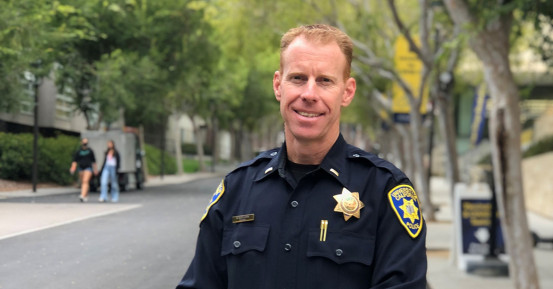By:
Published Date
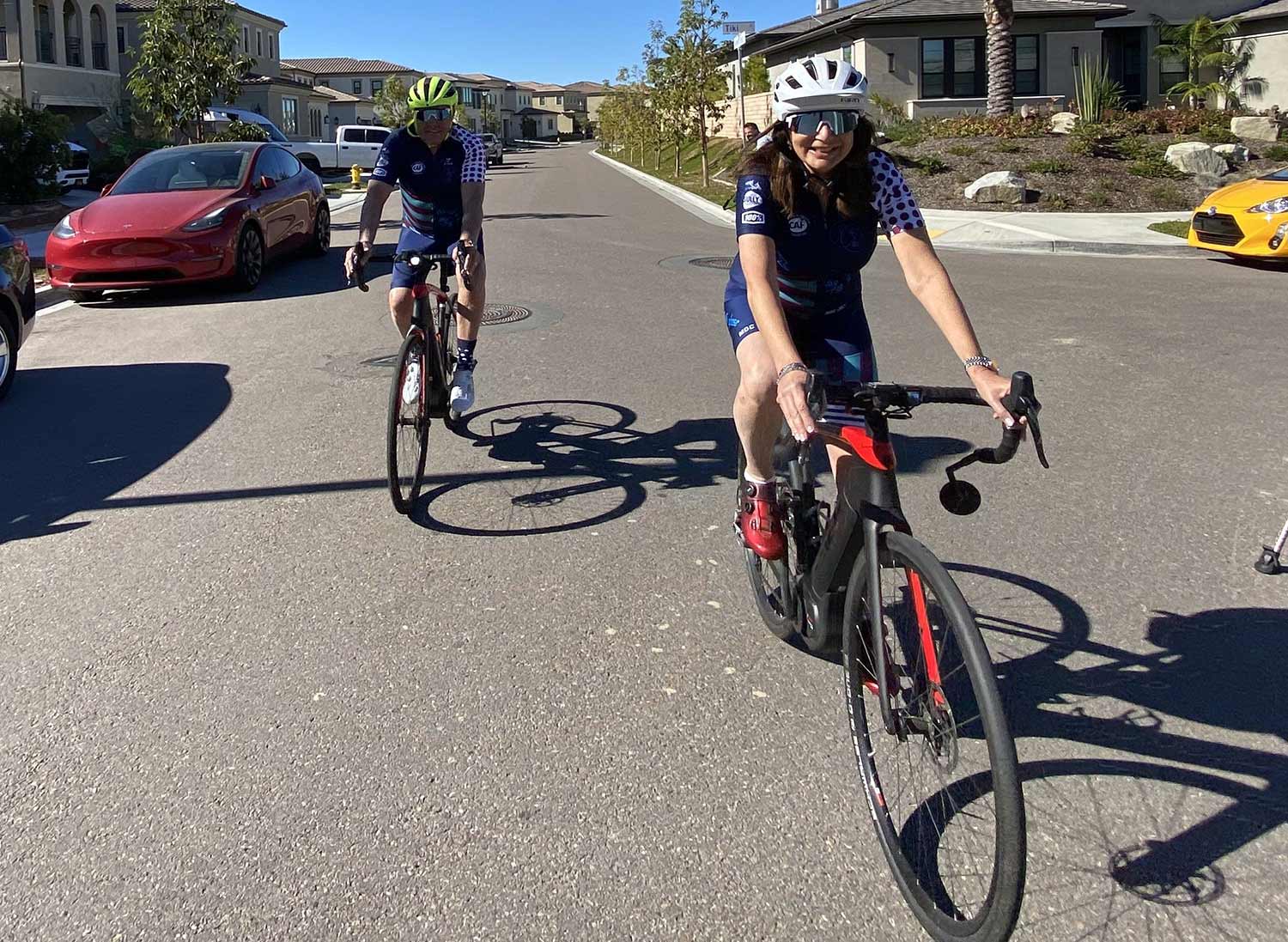
Willing Yourself Well
UC San Diego Health patient proves you don’t need a functioning heart to function perfectly
Mandy Berzak recalled recently asking her UC San Diego Health cardiologist whether she should wear a heart monitor, to make sure her heart didn’t beat too fast during the long-distance cycling events she took up with her husband, Harry, only a couple months after her second heart surgery.
Then the 59-year-old San Diego resident realized her error.
“Why would I need a device that monitors my heart rate when it’s always the same?” she asked.
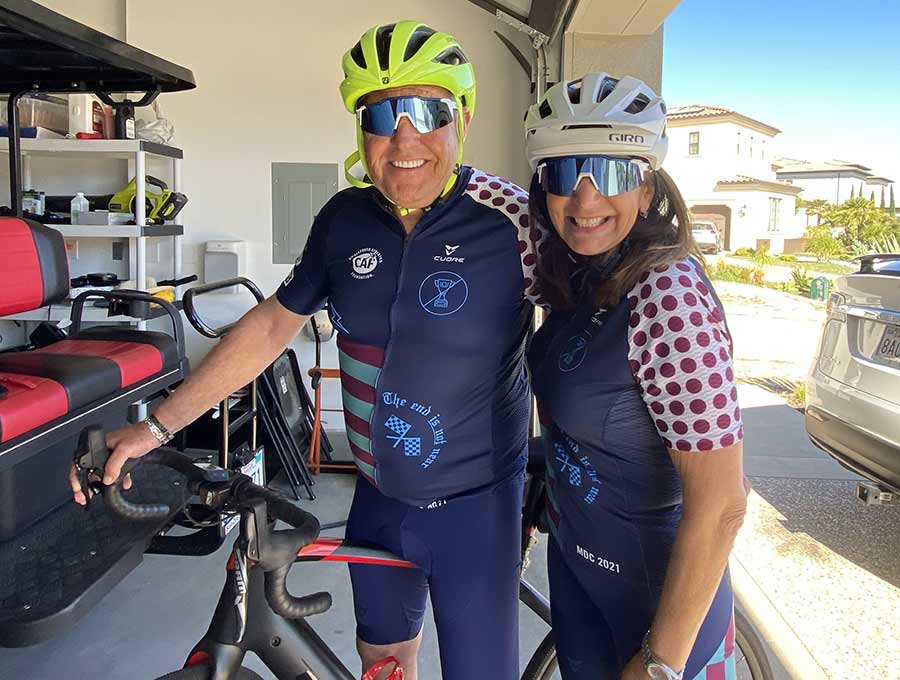
Mandy Berzak, right, took up long-distance cycling with her husband, Harry, only a couple of months after her second heart surgery at UC San Diego Health.
Mandy’s heart is triggered by a pacemaker/defibrillator to beat 70 times per minute, regardless of how much exercise she engages in, because it can no longer conduct electrical signals on its own.
Four years ago, Mandy felt extremely anemic. After several rounds of tests, the team at UC San Diego Health identified an aortic valve condition called Heyde syndrome. In June 2018, she underwent valve replacement surgery and was home recovering within five days.
“Eight weeks later, we attended a wedding in Ireland and I was feeling great,” Mandy said.
But 18 months later, Mandy suffered a stroke and collapsed in her kitchen. The valve replacement had developed an infection leading to life-threatening endocarditis. (Its cause remains a mystery, though it was unrelated to the original procedure.)
Mandy underwent another procedure, performed by Eugene Golts, MD, cardiothoracic surgeon, to re-replace her valve and install the pacemaker in April 2020. Nonetheless, her heart was so weak, it stopped three times.
“The CPR went on for so long, I didn’t know if she would make it out of the catheterization lab,” said Lori Daniels, MD, professor and medical director of the Cardiovascular Intensive Care Unit at UC San Diego Health. “And if she did, I didn’t know how well her brain and body would recover. I was extremely concerned.”
Mandy’s husband, Harry, visited every day during the last two weeks of Mandy’s six-week ICU stay—an unfortunate visit limitation imposed by COVID rules—to offer love, support and bagels.
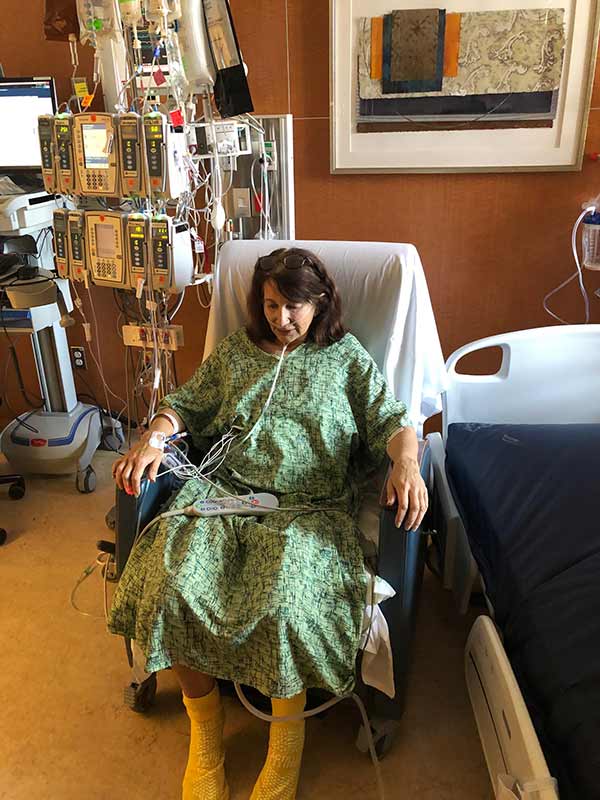
Mandy recovers at UC San Diego Health from surgery to replace an infected heart valve and install a pacemaker.
“I got to know all of Mandy’s caregivers by name,” said the 62-year-old non-Hodgkin's lymphoma survivor, who ran a hotel renovation business before retiring. “They became like my family, every one of them.”
This fact became very important once their story took a turn toward the bizarre.
One morning while Mandy recuperated at home with a life vest, milrinone pump, heart monitor and medication, Harry awoke and announced that he could not breathe. Suspecting COVID-19, Mandy shoved him in the back seat, made him stick his head out the window, and raced to the hospital.
“We laugh about it now, but I couldn’t catch COVID-19 in my condition,” she said.
It wasn’t COVID-19, but a heart attack; the worst kind, too: a STEMI, short for ST-elevation myocardial infarction. So Harry found himself in the same UC San Diego Health cardiology unit that had treated his wife.
“Oh man, I think we gave each other a hug when I first saw him after that,” said Daniels, who recalled Harry cracking: “‘You see, I liked you so much, I wanted you for my cardiologist, too.’”
The Berzaks turned their heart recovery into a joint effort, supporting one another through cardiac rehabilitation exercises, appointments and lifestyle changes. With the help of the team at UC San Diego Health, husband and wife were back on their bikes prepping for a long ride in support of challenged athletes. Harry did a 640-mile ride from San Francisco to San Diego and Amanda joined him in Santa Barbara to complete 250 miles.
“Cycling has just become really important to me,” Mandy said. “It gives me a sense of normalcy, enjoyment and freedom.” (Mandy is competing in the upcoming 24th Annual Tour de Palm Springs, a 100-mile charity cycling event that Harry would also have entered if not for recent knee surgery.)
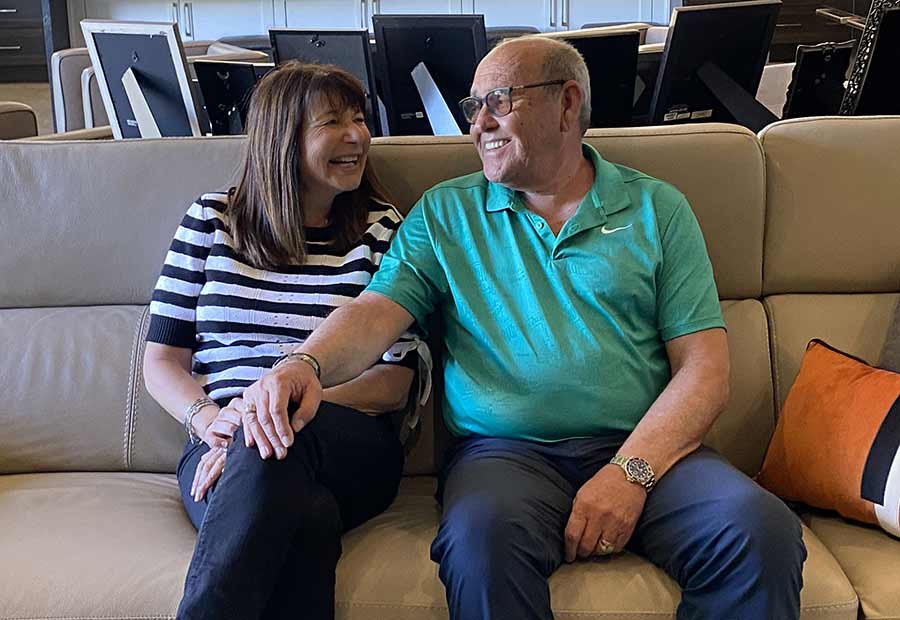
Despite their health concerns, Mandy and Harry Berzak laugh constantly, inspiring nearly everyone who gets to meet them.
Mandy might still need a heart transplant one day, but she is undaunted.
“It does no good to worry about the future, because you can’t know it,” she said, flashing an almost-constant smile. “Anyway, I’ve got fabulous things to look forward to in my future—like FaceTiming my two grandchildren every morning—and I just don't have the time or the patience to worry.”
Despite their health issues, both Mandy and Harry radiate positive temperaments that let them roll with whatever life throws in their way.
"I've always been a believer that there's always good in a situation, as cliché as it might sound,” Mandy said. “When you're in the ICU and you see what's happening in the 12 beds as you walk around, you just think to yourself, ‘There's always light, life always has more to offer.’ It might not be what somebody else considers a good life, but for me, I have a great life.”
Daniels feels certain that this attitude has helped prolong and improve the lives of both Berzaks.
“It’s not something I can prove scientifically,” she said, “but just in my experience with seeing people with positive attitudes, I can only believe that it helped guide both of them to such amazing outcomes.”
Harry has made a complete recovery from his heart attack. Mandy’s heart is still weak, but improving. Daniels says it now pumps on its own.
“Over the past year and a half, it has recovered enough that Mandy did not end up requiring a transplant or a ventricular assist device,” she said, ‘and that is just incredible.’
Share This:
You May Also Like
Stay in the Know
Keep up with all the latest from UC San Diego. Subscribe to the newsletter today.
